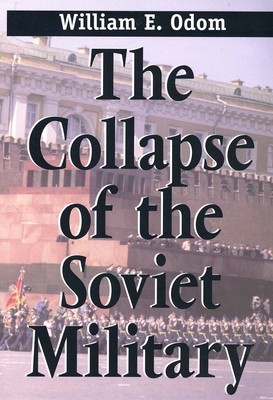
- We will send in 10–14 business days.
- Author: William E Odom
- Publisher: Yale University Press
- Year: 2000
- ISBN-10: 0300082711
- ISBN-13: 9780300082715
- Format: 15.7 x 23.4 x 3.3 cm, softcover
- Language: English
- SAVE -10% with code: EXTRA
Reviews
Description
One of the great surprises in modern military history is the collapse of the Soviet Armed Forces in 1991--along with the party-state with which it was inextricably intertwined. In this important book, a distinguished United States Army officer and scholar traces the rise and fall of the Soviet military, arguing that it had a far greater impact on Soviet politics and economic development than was perceived in the West.
General William E. Odom asserts that Gorbachev saw that dramatically shrinking the military and the military-industrial sector of the economy was essential for fully implementing perestroika and that his efforts to do this led to the dissolution of the Soviet Union. Odom enhances his account with interviews with key actors in the Soviet Union before, during, and after the collapse. He describes the condition of the Soviet military during the mid-1980s and explains how it became what it was--its organizational structures, manpower policies, and military-industrial arrangements. He then moves to the dramatic events that led to its destruction, taking us to the most secret circles of Soviet policy making, as well as describing the public debates, factional struggles in the new parliament, and street combat as army units tried to repress the political forces unleashed by glasnost. Odom shows that just as the military was the ultimate source of stability for the multinational Soviet state, the communist ideology justified the military's priority claim on the economy. When Gorbachev tried to shift resources from the military to the civilian sector to overcome economic stagnation, he had to revise the official ideology in order to justify removing the military from its central place. Paralyzed by corruption, mistrust, and public disillusionment, the military was unable and unwilling to intervene against either Gorbachev's perestroika or Yeltsin's dissolution of the Soviet Union.EXTRA 10 % discount with code: EXTRA
The promotion ends in 4d.13:43:24
The discount code is valid when purchasing from 10 €. Discounts do not stack.
- Author: William E Odom
- Publisher: Yale University Press
- Year: 2000
- ISBN-10: 0300082711
- ISBN-13: 9780300082715
- Format: 15.7 x 23.4 x 3.3 cm, softcover
- Language: English English
One of the great surprises in modern military history is the collapse of the Soviet Armed Forces in 1991--along with the party-state with which it was inextricably intertwined. In this important book, a distinguished United States Army officer and scholar traces the rise and fall of the Soviet military, arguing that it had a far greater impact on Soviet politics and economic development than was perceived in the West.
General William E. Odom asserts that Gorbachev saw that dramatically shrinking the military and the military-industrial sector of the economy was essential for fully implementing perestroika and that his efforts to do this led to the dissolution of the Soviet Union. Odom enhances his account with interviews with key actors in the Soviet Union before, during, and after the collapse. He describes the condition of the Soviet military during the mid-1980s and explains how it became what it was--its organizational structures, manpower policies, and military-industrial arrangements. He then moves to the dramatic events that led to its destruction, taking us to the most secret circles of Soviet policy making, as well as describing the public debates, factional struggles in the new parliament, and street combat as army units tried to repress the political forces unleashed by glasnost. Odom shows that just as the military was the ultimate source of stability for the multinational Soviet state, the communist ideology justified the military's priority claim on the economy. When Gorbachev tried to shift resources from the military to the civilian sector to overcome economic stagnation, he had to revise the official ideology in order to justify removing the military from its central place. Paralyzed by corruption, mistrust, and public disillusionment, the military was unable and unwilling to intervene against either Gorbachev's perestroika or Yeltsin's dissolution of the Soviet Union.

Reviews